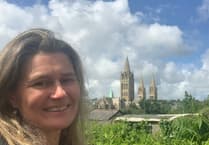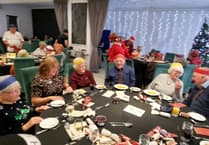A wreath-laying ceremony took place at Truro’s war memorial to commemorate the lives of those who served in D-Day on the beaches of Normandy 80 years ago.
Boscawen Street was briefly closed for traffic as Royal British Legion representatives were joined by veterans, town crier Lionel Knight, city mayor Cllr Carol Swain and representatives of Truro City Council.
Leading the event, Barry Cooper, chairman of the Truro branch of the Royal British Legion (RBL), said: “It’s important to commemorate the 80th anniversary as a mark of respect for those who died for our freedom – and especially so for the veterans, who are getting very aged now.
“It’s very personal for me as my grandfather was on Gold Beach, stranded with the rest of his ship on a landing craft which had hit a mine and waited 24 hours to be repaired. Looking at the bigger picture, that’s one story out of 250,000, some of which unfortunately did not get to be told.”
Veteran John Ward, 86, served in Malaya in 1957. He was close to tears as he said: “I’m here to pay my respects. I lost a few friends – I came back, they didn’t. I was lucky, they weren’t. As such, I do everything I can to remember them.”
Asked how he felt about his participation in events throughout the day, RBL standard bearer Simon Cundy said: “In a word – proud. While I never served, the Poppy Appeal and remembrance were drilled into me as a child. We mustn’t forget.”
RBL ceremonial bugler Gillian Allen delivered a pitch-perfect Last Post and Reveille while wearing the medals of her late grandfather, William “Tipper” Hicks, who served in the Devon and Cornwall Light Infantry and was well-known in the Penzance area.
“As I play such a regular part in ceremonial occasions, as well as fundraising events for the RBL, I thought it would be a fitting tribute to wear his medals, and have started doing so this year,” she said.
Students of Pencalenick School were present with teacher Chris Brigg, who said: “We are here to pay our respects to the veterans, but also to reinforce our work on values such as teamwork, respect and communication.” He explained how the boys were also exploring the school’s Second World War history - the US Army arrived in Truro in late 1943 and camped under canvas tents in the grounds.




Comments
This article has no comments yet. Be the first to leave a comment.